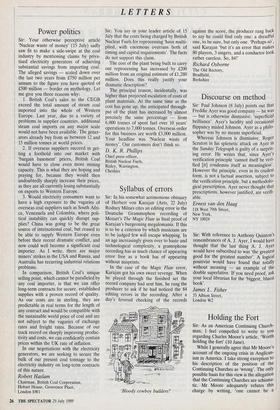LETTERS Power politics
Sir: Your otherwise perceptive article `Nuclear waste of money' (15 July) sadly saw fit to make a side-swipe at the coal industry by mentioning claims by priva- tised electricity generators of achieving substantial savings from importing coal. The alleged savings — scaled down over the last two years from £750 million per annum to the figure you have quoted of £500 million — border on mythology. Let me give you three reasons why: 1. British Coal's sales to the CEGB exceed the total amount of steam coal imported into the whole of Western Europe. Last year, due to a variety of problems in supplier countries, additional steam coal imports on any major scale would not have been available. The gener- ators already buy from us between 12 and 15 million tonnes at world prices.
2. If overseas suppliers succeed in get- ting a foothold into our market with 'bargain basement' prices, British Coal would have to close even more mining capacity. This is what they are hoping and praying for, because they would then undoubtedly sharply increase their prices, as they are all currently losing substantially on exports to Western Europe.
3. Would electricity consumers want to have a high exposure to the vagaries of overseas coal suppliers such as South Afri- ca, Venezuela and Colombia, where poli- tical instability can quickly disrupt sup- plies? China was going to be the great source of international coal, but ceased to be able to supply Western Europe even before their recent dramatic conflict, and now could well become a significant coal importer. As I write, there are major miners' strikes in the USA and Russia, and Australia has recurring industrial relations problems.
In comparison, British Coal's unique selling point, which cannot be paralleled by any coal importer, is that we can offer long-term contracts for secure, established supplies with a proven record of quality. As our costs are in sterling, they are predictable in real terms for the length of any contract and would be compatible with the sustainable world price of coal and are not subject to the vagaries of exchange rates and freight rates. Because of our track record on sharply improving produc- tivity and costs, we can confidently contain prices within the UK rate of inflation.
In our negotiations with the electricity generators, we are seeking to secure the bulk of our present coal tonnage to the electricity industry on long-term contracts of this nature.
Robert Haslam
Chairman, British Coal Corporation, Hobart House, Grosvenor Place, London SW1


















































 Previous page
Previous page